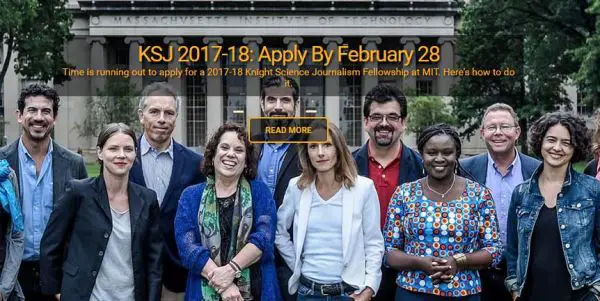
The Knight Science Journalism Fellowship Program at Massachusetts Institute of Technology (MIT) supports a global community of dedicated and thoughtful journalists specializing in science, health, technology and environmental reporting. KSJ@MIT is designed to recognize journalists who demonstrate a high level of professional excellence and accomplishment as well as a long-term commitment to their craft. Journalists from all countries compete on an equal basis and are encouraged to apply. Fellows receive a stipend of $70,000 as well as some additional benefits, including basic health insurance.
The Massachusetts Institute of Technology (MIT) is a private research university in Cambridge, Massachusetts, often cited as one of the world’s most prestigious universities.
Eligibility:
To be eligible for a KSJ@MIT Fellowship, applicants must:
- Be full-time journalists, whether on staff or freelance. Part-time writers or producers are not eligible.
- Have at least three full years of experience covering science, technology, the environment, or medicine.
- Be reporters, writers, editors, producers, illustrators, filmmakers, or photojournalists. This includes work for newspapers, magazines, television, radio, and digital media.
How to Apply:
The following documents are required for 9-Month Fellowship applications:
- Professional Autobiography: Provide a brief statement (500-word maximum) about why you want to participate in the Knight Science Journalism Fellowship Program at MIT and how it would fit with your professional goals.
- Resume or Curriculum Vitae: Be sure to include your education and work history. (Freelancers should include a list of freelance jobs in the last 12 months. Include each story, venue, and date of publication or broadcast.)
- Research Proposal: In consultation with the KSJ staff, Knight fellows will develop and produce a research project in a chosen area of science or science journalism. This project is intended to be developed as if for publication, in formats ranging from multimedia to long-form story. Research projects are reviewed by KSJ staff and Knight Fellows and will be considered for publication by KSJ during the academic year, either in Undark magazine or as a special presentation on the KSJ website. Fellows will deliver a formal presentation on their topic at the end of the fellowship year. All applicants should describe, in 500 words or less, a project to be developed during the desired fellowship.
- Work Samples: Five relevant work samples are required. Choose samples that best illustrate your interest and abilities. Please include a translation for any work, not in English.
- Professional References: Three letters of recommendation are required. Letters should come from individuals familiar with your work and should comment on your abilities and your commitment to journalism.
- International Applicants: They strongly recommend that you take a language proficiency test (such as TOEFL) and submit your scores as part of your application. This is an MIT requirement for visa processing. If you complete your application submission before receiving your TOEFL scores, you may email them directly to KSJ program administrator, Bettina Urcuoili, at bma-at-mit.edu. If you are not able to take the test in time, the KSJ staff will work with you on a possible waiver to that requirement. If so, do let us know your situation as soon as possible.
Submitting Details:
You can submit your complete application packet through the given link:
https://ksj.submittable.com/submit/70589/2017-2018-ksjmit-fellowship-application
Financial Aid and Award Money:
- Award Money: Every year, the Knight Science Journalism Program (KSJ) offers ten science journalists a 9-month fellowship. Fellows receive a stipend of $70,000 as well as some additional benefits, including basic health insurance.
- Among the many Knight Fellowship programs and activities:
- Seminars: Fellows meet regularly for seminars with top researchers and media professionals.
- Field Trips: The program organizes several trips each year to locations of special interest to science and technology writers. Past destinations have included the Woods Hole Oceanographic Institution and the Marine Biological Laboratory in Woods Hole, MA, the Jackson Laboratory in Bar Harbor, ME, and the Harvard Forest in Petersham, MA.
- Digital Media Training: The number of storytelling channels open to journalists is multiplying, and we want our Fellows to return to the workforce with more technical skills than they had to come in. They offer workshops in various technologies, including video and audio capture, still photography, digital editing, data journalism, and podcasting.
- Workshops: With support from the Kavli Foundation, the program organizes an annual workshop on an essential issue in science journalism, which may range from policy-based questions to basic science backgrounders, such as a series of lectures from leading nanotechnology researchers. These workshops are open to the larger science writing community on a competitive basis but all Knight Fellows are offered automatic admission to these workshops if they choose to attend
Application Deadline:
The 2017-18 application cycle runs January 1, 2017, through February 28, 2017.
Link for More Information:
Contact Information:
For further questions, please contact Bettina Urcuioli at bma-at-mit.edu.

